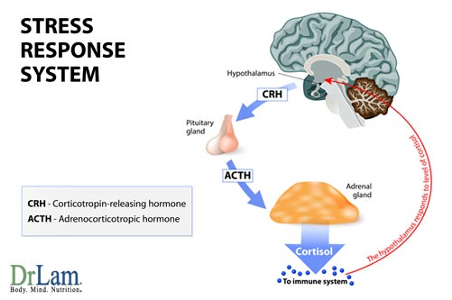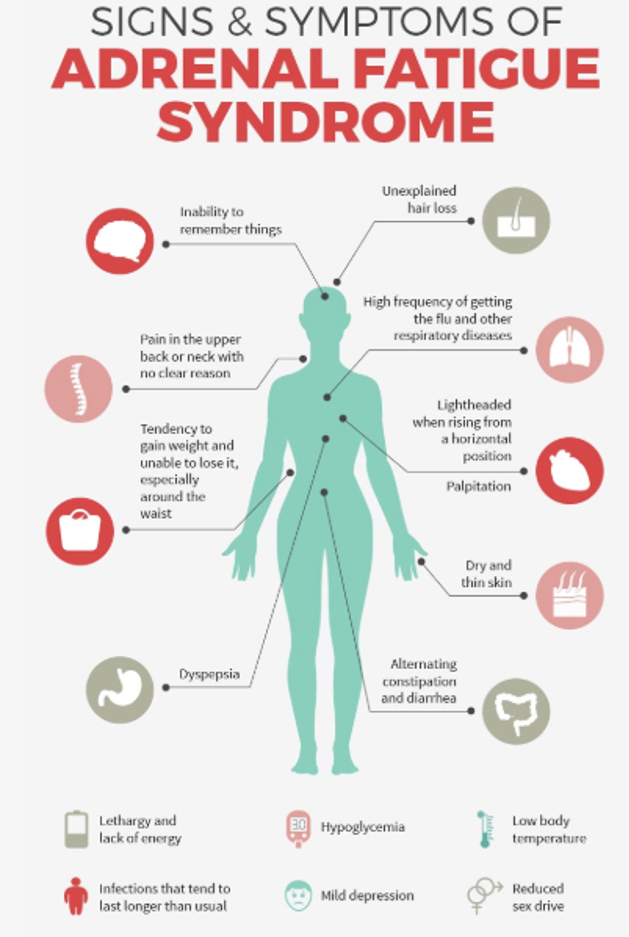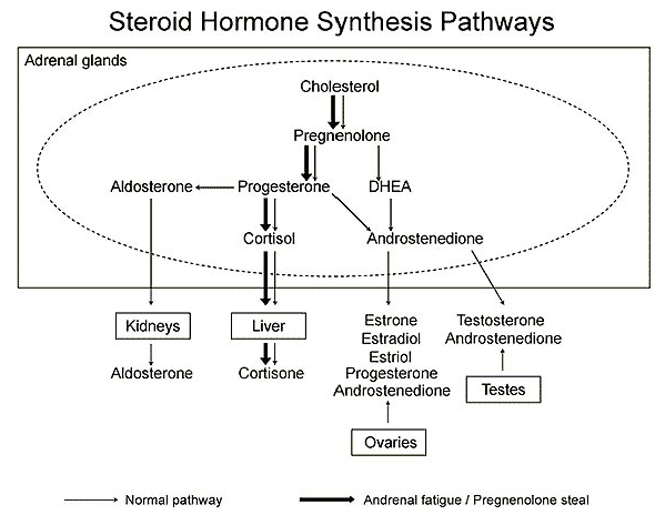If you feel tiredness associated with symptoms like difficulty concentrating, insomnia, inability to lose weight, anxiety, allergies, “mental fog”, etc… you may be experiencing adrenal fatigue.
Adrenal fatigue consists of a series of symptoms that are nonspecific but debilitating, and often appear insidiously. Stress is what lies at the core of this syndrome, so it is absolutely critical to manage it. At the anthropological level, it is even vital for survival, and our adrenal glands are responsible for controlling it.
Dr. Alfonso Galán González – Neolife Medical Team
What is adrenal fatigue? Does it really exist? How common is it?
One of the most common health-related complaints at the moment is fatigue and tiredness. If you feel tiredness associated with symptoms like difficulty concentrating, insomnia, inability to lose weight, anxiety, allergies, “mental fog”, etc… you may be experiencing adrenal fatigue.
Adrenal fatigue consists of a series of symptoms that are nonspecific but debilitating, and often appear insidiously. Stress is what lies at the core of this syndrome, so it is absolutely critical to manage it. At the anthropological level, it is even vital for survival, and our adrenal glands are responsible for controlling it.
Adrenal fatigue is a diagnosis that is not yet accepted by all fields of medicine; the classic view is that the adrenal glands are structurally normal, and there is no evidence of adrenal insufficiency or Addison’s disease, which is an autoimmune disease, meaning that our own antibodies attack the gland damaging its structure and function.
Adrenal fatigue is a “functional” problem. The glands are not working properly, and the main cause is usually sustained stress. Some prefer to call it hypothalamic–pituitary–adrenal axis dysregulation.

Like all syndromes, adrenal fatigue is a set of symptoms and signs that include the following:
- Tendency to gain weight and inability to lose it, especially around the waist
- Recurring respiratory infections
- Infections that last longer than normal
- Tendency to start shaking when under pressure
- Lower sex drive
- Dizziness when sitting up from a horizontal position
- Inability to remember things
- Lack of energy in the mornings and evenings
- Feeling better shortly after meals
- Feeling tired at about 9 or 10 p.m. but reluctant to go to bed
- Needing coffee and stimulants to get going in the morning
- Needing salty, fatty, and protein-rich products with meat and cheese
- Increased symptoms of PMS in women with more irregular periods (initial heavy bleeding, pause, then bleeding again)
- Back pain and neck pain for no apparent reason
- Feeling better while on vacation or during stress-free periods
- Difficulty getting up in the morning
- Symptoms of depression
- Allergies to food or inhalants
- Lack of energy, feeling lethargic
- Doing everyday tasks requires tremendous effort
- Less ability to manage stress
- Thin, dry skin
- Low blood sugar
- Low body temperature
- Nervousness
- Heart palpitations
- Unexplained hair loss
- Alternating between diarrhea and constipation
- Digestive problems
If you are experiencing any of these symptoms, you may have adrenal fatigue. There is no single symptom that will diagnose it; it’s necessary to look at the whole picture, collectively. These symptoms are usually the end result of severe and excessive, acute or chronic stress. And the body can’t take it anymore. The adrenal glands are dysfunctional and can’t handle it.

The adrenal glands are two structures the size of large grapes, located above the kidneys. They have two compartments:
- The medulla that modulates the sympathetic nervous system through two hormones called Adrenaline and Norepinephrine.
- The adrenal cortex that produces about 50 hormones that can be grouped into Glucocorticoids (regulate blood sugar levels), mineralocorticoids (regulate minerals and blood pressure), and androgens.
The most important Glucocorticoid is cortisol. When it’s not being produced properly, the body can’t handle stress.
Mineralocorticoids, like Aldosterone, regulate the balance of minerals, especially sodium and potassium, thus regulating blood pressure and fluids in the body. Stress increases aldosterone, producing water retention and high blood pressure. At the onset of adrenal fatigue, we lose sodium and potassium. This often leads to significant symptoms, including cardiac arrhythmias.
The adrenal cortex effectively produces sex hormones, albeit in small quantities. The exception is dehydroepiandrosterone (DHEA), which is produced in large quantities from another important hormone: pregnenolone. In other blog posts, you’ll find specific articles about these two hormones and their practical uses.

Let’s talk a little more in depth about cortisol. It is the body’s most important anti-stress hormone:
- It increases blood sugar levels. It works hand in hand with insulin to provide glucose to the body. We need more energy when we’re under stress. With adrenal fatigue, cortisol initially rises and subsequently its production is lowered.
- It reduces inflammation. It is a very potent anti-inflammatory agent, secreted as part of the inflammatory response.
- It suppresses the immune system. People with high cortisol have a weaker immune system. It suppresses leukocytes, NK cells, monocytes, macrophages, and mast cells.
- It regulates blood pressure, by contracting medium-sized arteries. Individuals with low cortisol have low blood pressure.
- It regulates stress. High levels of stress require high cortisol levels. When these levels can’t be raised, stress tolerance decreases, and it’s impossible to maintain an optimal response to it.
Cortisol is regulated by ACTH (Adrenocorticotropic Hormone), which in turn is regulated by CRH (Corticotropin-Releasing Hormone). Its secretion follows a daytime pattern, with higher levels at 8 a.m. Its levels drop during the day, with some peaks depending on the number of stress-causing situations. Its lowest levels are found between midnight and 4 a.m.
Causes of adrenal fatigue
Stress is common in Western societies. The causes of stress can be varied: work, family tragedies, moving, illness, divorces, etc. Adrenal fatigue occurs when the stress we are subjected to exceeds the body’s abilities to compensate it and recover.
The following are some of the stressors that may lead to adrenal fatigue:
- Anger
- Depression
- Chronic illness
- Over-exercising
- Chronic infections
- Fear and guilt
- Chronic pain
- Gluten intolerance
- Hypoglycemia
- Malabsorption
- Digestive problems
- Exposure to toxic chemicals
- Surgeries
- Sleep deprivation
- Excess sugar in the diet
- Excess caffeine
- among others…
How do stressors affect the body?
When we are under stress, the body initiates a stress reaction, also known as a neuroendocrine stress response, which encompasses 6 circuits that help us regulate it:
- Hormonal
- Bioenergetic
- Detoxification
- Inflammatory
- Neuroaffective
- Cardionomic
When stress is chronic, symptoms begin to appear in these different circuits and organs that suffer dysregulation. This stimulates the sympathetic nervous system, which leads to the secretion of adrenaline by the adrenal marrow and ACTH by the hypothalamus so that more cortisol is secreted.
The hormone circuit mentioned is composed of the ovaries, the adrenal gland, and the thyroid gland. As mentioned before, when stress is continuous, the levels of cortisol rise so much that the gland is depleted and the already mentioned DHEA ceases to occur in sufficient quantities. This decrease in DHEA and initial rise in cortisol leads to an elevated cortisol/DHEA ratio, which in turn leads to very harmful consequences such as (2):
- Lower insulin sensitivity with increased blood sugar leading to diabetes.
- Lower secretion of Immunoglobulins (IgA), Natural Killer Cells (NK), and T-cell activity, which leads to a higher susceptibility to infections like herpes, thrush, or viral infections.
- Blockage of calcium absorption, which lowers bone density, leading to osteoporosis.
- Higher accumulation of central fat and protein destruction, leading to the loss of muscle mass and the inability to lose weight.
- Increased water and salt retention.
- Estrogenic dominance in women, leading to PMS, fibroids, and breast cysts.
BIBLIOGRAPHY
(1) Kumari M, Badrick E, Chandola T, Adam EK, Stafford M, Marmot MG, Kirschbaum C, Kivimaki M. Cortisol secretion and fatigue: associations in a community based cohort. Psychoneuroendocrinology. 2009 Nov;34(10):1476-85.
(2) Sonnenschein M, Mommersteeg PM, Houtveen JH, Sorbi MJ, Schaufeli WB, van Doornen LJ. Exhaustion and endocrine functioning in clinical burnout: an in-depth study using the experience sampling method. Biol Psychol. 2007 May;75(2):176-84
